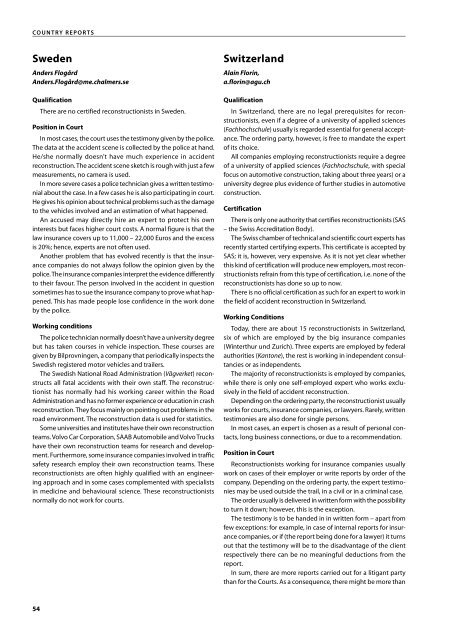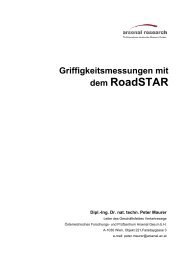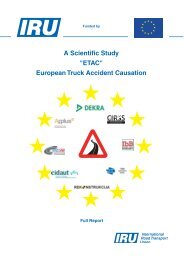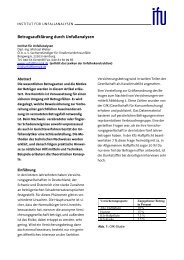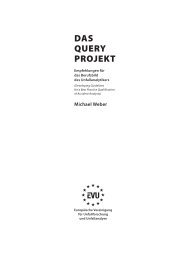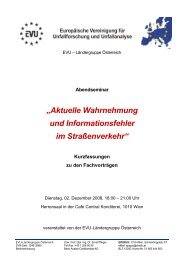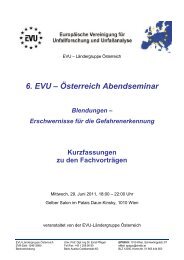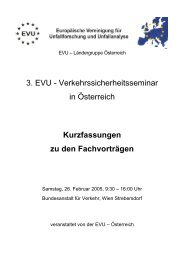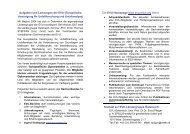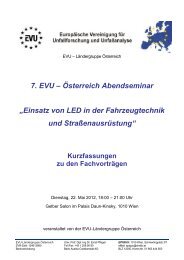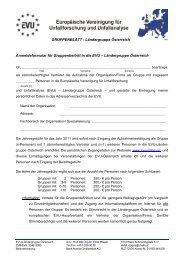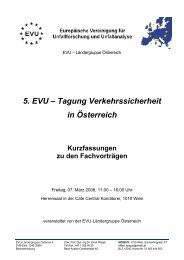THE QUERY PROJECT - European Commission - Europa
THE QUERY PROJECT - European Commission - Europa
THE QUERY PROJECT - European Commission - Europa
You also want an ePaper? Increase the reach of your titles
YUMPU automatically turns print PDFs into web optimized ePapers that Google loves.
Co u n t R y R E P o R t S<br />
Sweden<br />
Anders Flogård<br />
Anders.Flogård@me.chalmers.se<br />
Qualification<br />
There are no certified reconstructionists in Sweden.<br />
Position in Court<br />
In most cases, the court uses the testimony given by the police.<br />
The data at the accident scene is collected by the police at hand.<br />
He/she normally doesn’t have much experience in accident<br />
reconstruction. The accident scene sketch is rough with just a few<br />
measurements, no camera is used.<br />
In more severe cases a police technician gives a written testimonial<br />
about the case. In a few cases he is also participating in court.<br />
He gives his opinion about technical problems such as the damage<br />
to the vehicles involved and an estimation of what happened.<br />
An accused may directly hire an expert to protect his own<br />
interests but faces higher court costs. A normal figure is that the<br />
law insurance covers up to 11,000 – 22,000 Euros and the excess<br />
is 20%; hence, experts are not often used.<br />
Another problem that has evolved recently is that the insurance<br />
companies do not always follow the opinion given by the<br />
police. The insurance companies interpret the evidence differently<br />
to their favour. The person involved in the accident in question<br />
sometimes has to sue the insurance company to prove what happened.<br />
This has made people lose confidence in the work done<br />
by the police.<br />
working conditions<br />
The police technician normally doesn’t have a university degree<br />
but has taken courses in vehicle inspection. These courses are<br />
given by Bilprovningen, a company that periodically inspects the<br />
Swedish registered motor vehicles and trailers.<br />
The Swedish National Road Administration (Vägverket) reconstructs<br />
all fatal accidents with their own staff. The reconstructionist<br />
has normally had his working career within the Road<br />
Administration and has no former experience or education in crash<br />
reconstruction. They focus mainly on pointing out problems in the<br />
road environment. The reconstruction data is used for statistics.<br />
Some universities and institutes have their own reconstruction<br />
teams. Volvo Car Corporation, SAAB Automobile and Volvo Trucks<br />
have their own reconstruction teams for research and development.<br />
Furthermore, some insurance companies involved in traffic<br />
safety research employ their own reconstruction teams. These<br />
reconstructionists are often highly qualified with an engineering<br />
approach and in some cases complemented with specialists<br />
in medicine and behavioural science. These reconstructionists<br />
normally do not work for courts.<br />
Switzerland<br />
Alain Florin,<br />
a.florin@agu.ch<br />
Qualification<br />
In Switzerland, there are no legal prerequisites for reconstructionists,<br />
even if a degree of a university of applied sciences<br />
(Fachhochschule) usually is regarded essential for general acceptance.<br />
The ordering party, however, is free to mandate the expert<br />
of its choice.<br />
All companies employing reconstructionists require a degree<br />
of a university of applied sciences (Fachhochschule, with special<br />
focus on automotive construction, taking about three years) or a<br />
university degree plus evidence of further studies in automotive<br />
construction.<br />
Certification<br />
There is only one authority that certifies reconstructionists (SAS<br />
– the Swiss Accreditation Body).<br />
The Swiss chamber of technical and scientific court experts has<br />
recently started certifying experts. This certificate is accepted by<br />
SAS; it is, however, very expensive. As it is not yet clear whether<br />
this kind of certification will produce new employers, most reconstructionists<br />
refrain from this type of certification, i.e. none of the<br />
reconstructionists has done so up to now.<br />
There is no official certification as such for an expert to work in<br />
the field of accident reconstruction in Switzerland.<br />
working Conditions<br />
Today, there are about 15 reconstructionists in Switzerland,<br />
six of which are employed by the big insurance companies<br />
(Winterthur und Zurich). Three experts are employed by federal<br />
authorities (Kantone), the rest is working in independent consultancies<br />
or as independents.<br />
The majority of reconstructionists is employed by companies,<br />
while there is only one self-employed expert who works exclusively<br />
in the field of accident reconstruction.<br />
Depending on the ordering party, the reconstructionist usually<br />
works for courts, insurance companies, or lawyers. Rarely, written<br />
testimonies are also done for single persons.<br />
In most cases, an expert is chosen as a result of personal contacts,<br />
long business connections, or due to a recommendation.<br />
Position in Court<br />
Reconstructionists working for insurance companies usually<br />
work on cases of their employer or write reports by order of the<br />
company. Depending on the ordering party, the expert testimonies<br />
may be used outside the trail, in a civil or in a criminal case.<br />
The order usually is delivered in written form with the possibility<br />
to turn it down; however, this is the exception.<br />
The testimony is to be handed in in written form – apart from<br />
few exceptions: for example, in case of internal reports for insurance<br />
companies, or if (the report being done for a lawyer) it turns<br />
out that the testimony will be to the disadvantage of the client<br />
respectively there can be no meaningful deductions from the<br />
report.<br />
In sum, there are more reports carried out for a litigant party<br />
than for the Courts. As a consequence, there might be more than


